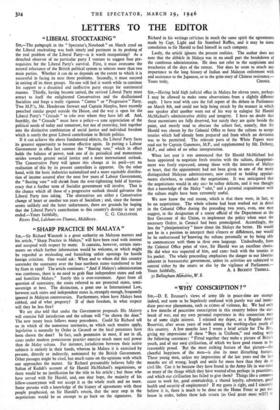" SHARP PRACTICE IN MALAYA "
Sta,—Sir Richard Winstedt is a great authority on Malayan matters and his article, " Sharp Practice in Malaya," will have been read with interest and accepted with respect by many. It contains, however, certain state- ments on which further information would be welcome, or which might be regarded as misleading and furnishing unfair openings for hostile foreign criticism. One would ask: When and to whom did this country surrender the suzerainty over the four northern states-transferred to her by Siam in 19Ky9? The article continues: " And if Malaya's administration was cumbrous, there is no need to grab four independent states and rob and humiliate Malays." Surely this is over-statement. Apart from all question of suzerainty, the states referred to are protected states, semi- sovereign at best. The distinction, a great one in International Law, between such states and independent states is, strangely enough, frequently ignored in Malayan controversies. Furthermore, when have Malays been robbed, and of what property? If of their freedom, in what respect will they be less free?
We are also told that under the Government proposals His Majesty will exercise full jurisdiction and the sultans will "be shown the door." The new treaty basis follows many precedents. Could Sir Richard tell us in which of the numerous territories, to which such treaties apply, legislation is normally by Order in Council or the local potentates have been shown the door? In fact, such potentates in most, if not in all, cases under modern protectorate practice exercise much more real power than do Malay sultans. For instance, jurisdiction between their native subjects is entirely in their hands, whereas in Malaya it is exercised by persons, directly or indirectly, nominated by the British Government. Other passages might be cited, but much turns on the opinions with which one approaches the matter. Sir Richard presumably believes fully the Sultan of Kedah's account of Sir Harold McMichael's negotiations, or there would be no justification for the title to his article ; but those who have served with Sir Harold, and, one may hope, the majority of his fellow-countrymen will not accept it as the whole truth and no more. Some persons with a knowledge of the history of agreements with these people prophesied, on Sir Harold's return, that the next step in the negotiations would be an attempt to go back on the signatures. Sir Richard in his writings criticises in much the same spirit the agreements made by Capt. Light and Sir Stamford Raffles, and it may be some consolation to Sir Harold to find himself in such company.
Lastly, the article ignores the present realities. The author does not note that the debacle in Malaya was in no small part the breakdown of the cumbrous administration. He does not refer to the suspicions and treacheries of the days of the retreat. Nor does he seem to attach any importance to the long history of Indian and Malayan enlistment with and assistance to the Japanese, or to the grim story of Chinese resistance.—


























 Previous page
Previous page